Difference between revisions of "Chiyoko"
| Line 10: | Line 10: | ||
The next day she woke with tears in her eyes, the face of her mother inexplicably etched in her mind. The stranger, Susumu, was nowhere to be found, and with a sinking feeling of guilt weighing down her heart she realized just how much her mother would have disapproved. At that moment, she decided that it was time for her to be the daughter her parents would have envisioned her to be. After a brief farewell to her father with the promise of another visit soon, she flew home to Seattle and proposed to her lover. A month later they were married and eight months after that Steven Watanabe was born, the child who would eventually come to call himself Chiyo. | The next day she woke with tears in her eyes, the face of her mother inexplicably etched in her mind. The stranger, Susumu, was nowhere to be found, and with a sinking feeling of guilt weighing down her heart she realized just how much her mother would have disapproved. At that moment, she decided that it was time for her to be the daughter her parents would have envisioned her to be. After a brief farewell to her father with the promise of another visit soon, she flew home to Seattle and proposed to her lover. A month later they were married and eight months after that Steven Watanabe was born, the child who would eventually come to call himself Chiyo. | ||
| + | |||
| + | {| align="left" | ||
| + | | http://www.oakthorne.net/pics/wiki/naos/chiyo4.jpg | ||
| + | |} | ||
The years passed as they always do and Chiyo grew into an awkward adolescent. His “father” Mark Watanabe was a stable provider for the family, a musician turned producer in his old age. If Akiko sometimes found herself bored with her husband, she kept her mouth shut and dreamed of her one night of bliss with Susumu and the wonderful child that that union had created. As far as Mark knew, the child was his, and although Akiko knew better she decided to keep it to herself. | The years passed as they always do and Chiyo grew into an awkward adolescent. His “father” Mark Watanabe was a stable provider for the family, a musician turned producer in his old age. If Akiko sometimes found herself bored with her husband, she kept her mouth shut and dreamed of her one night of bliss with Susumu and the wonderful child that that union had created. As far as Mark knew, the child was his, and although Akiko knew better she decided to keep it to herself. | ||
| Line 16: | Line 20: | ||
Chiyo’s elementary years were bad enough as he found himself fundamentally different from those around him, but it wasn’t until high school that things started getting worse. By this time he’d suffered constant abuse over his “sissy” ways and had gotten himself in innumerable scuffles. He began taking a strange pride in his ability to fight, or in some cases, to take a beating. And if that wasn’t bad enough Chiyo had begun to take other outcasts under his wing, defending them from bullies even more than he would himself. His fatalistic attitude landed him several hospital visits and that, combined with the whispered confession of his sexual preference after his flamboyant boyfriend of the week showed up at the hospital, was when his mother realized that something really needed to be done. That was when she bought him his first guitar. | Chiyo’s elementary years were bad enough as he found himself fundamentally different from those around him, but it wasn’t until high school that things started getting worse. By this time he’d suffered constant abuse over his “sissy” ways and had gotten himself in innumerable scuffles. He began taking a strange pride in his ability to fight, or in some cases, to take a beating. And if that wasn’t bad enough Chiyo had begun to take other outcasts under his wing, defending them from bullies even more than he would himself. His fatalistic attitude landed him several hospital visits and that, combined with the whispered confession of his sexual preference after his flamboyant boyfriend of the week showed up at the hospital, was when his mother realized that something really needed to be done. That was when she bought him his first guitar. | ||
| + | |||
| + | {| align="right" | ||
| + | | http://www.oakthorne.net/pics/wiki/naos/chiyo5.jpg | ||
| + | |} | ||
The teen became as obsessed with music as his mother ever was, channeling all of his rage and angst into his instrument. He embraced punk as his personal outlet, finding it a perfect fit to his emotional torment while providing a slightly more acceptable way of dress—the punk aesthetic of makeup, crazy hairstyles and a certain androgyny filled his almost subconscious need to dress in women’s clothes. Through punk Chiyo discovered anarchy, political activism and fighting for a cause. The youth found himself embroiled in a hundred different riots, protest marches and strikes, subconsciously trying to fill the empty hole in his heart that was his lack of purpose. He had his music, he had his loving mother and his distant father, he even had his own unique form of expression, but he intrinsically knew that there was more to yearning than he had experienced. The only time that he ever found peace with himself was when he volunteered at the soup kitchens and homeless shelters in the city, usually dressed “incognito” in drab clothes that covered up his tattoos and wild hair. The last thing he wanted was for his hardcore image to become tarnished by his desire to help others in need. | The teen became as obsessed with music as his mother ever was, channeling all of his rage and angst into his instrument. He embraced punk as his personal outlet, finding it a perfect fit to his emotional torment while providing a slightly more acceptable way of dress—the punk aesthetic of makeup, crazy hairstyles and a certain androgyny filled his almost subconscious need to dress in women’s clothes. Through punk Chiyo discovered anarchy, political activism and fighting for a cause. The youth found himself embroiled in a hundred different riots, protest marches and strikes, subconsciously trying to fill the empty hole in his heart that was his lack of purpose. He had his music, he had his loving mother and his distant father, he even had his own unique form of expression, but he intrinsically knew that there was more to yearning than he had experienced. The only time that he ever found peace with himself was when he volunteered at the soup kitchens and homeless shelters in the city, usually dressed “incognito” in drab clothes that covered up his tattoos and wild hair. The last thing he wanted was for his hardcore image to become tarnished by his desire to help others in need. | ||
| Line 28: | Line 36: | ||
| − | + | {| align="left" | |
| − | {| align=" | ||
| http://www.oakthorne.net/pics/wiki/naos/chiyo1.jpg | | http://www.oakthorne.net/pics/wiki/naos/chiyo1.jpg | ||
|} | |} | ||
| Line 37: | Line 44: | ||
|} | |} | ||
| − | {| align=" | + | {| align="left" |
| http://www.oakthorne.net/pics/wiki/naos/chiyo3.jpg | | http://www.oakthorne.net/pics/wiki/naos/chiyo3.jpg | ||
| − | |||
| − | |||
| − | |||
| − | |||
| − | |||
| − | |||
| − | |||
| − | |||
|} | |} | ||
Revision as of 19:59, 7 January 2008
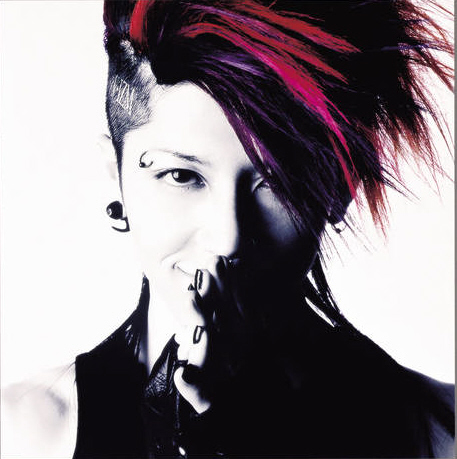
|
Scion of Susano-o
Concept
Chiyoko, sometimes known as Chiyo, sometimes as Steven Watanabe, is the distilled essence of chaos, constantly redefining himself in twitchy, arrogant sneers of disdain for the mundane. He embraces the world and all its vagaries as its most outlandish creation, a cross dressing punk musician with brass knuckles in his hand and a guitar slung across his silk-sheathed back. No matter how caught up in his quest to become the perfect rock star, however, he always manages to look out for those less fortunate than himself.
Chiyo was born in Tokyo in the fall of 1987. His mother, Akiko Masura, was known as something of a free spirit. Herself raised by an affluent, honorable Japanese family, her life was a constant struggle against smothering principles. Thankfully she was gifted as a brilliant violinist and was able to escape her parents in nearly constant “tours” all over Japan and abroad. After much success and a string of broken hearts left behind her, Akiko settled down to a semi-permanent relationship with a Japanese American in the States outside of Seattle. She was finally forced home when she received word that her mother had died. For all their differences, at one time Akiko and her mother had been close and the news struck her to the core. At the funeral one of the guests apparently had too much to drink and proceeded to make a fool of himself; although Akiko would have preferred to sit back and watch the uncomfortable scene, she decided that for once she’d honor her mother’s memory and play the peacemaker. Besides, the guy was handsome in a fumbling kind of way. Before she knew it she had offered the man a ride home but had somehow made it back to her hotel instead. As they stumbled up to her room, she realized the stranger—who had identified himself as Susumu—was much more attractive than she had previously estimated. There was something about him—his presence was overwhelming, his eyes the dark blue-green of the deep sea, his voice like a thunderclap. They entered her room and he collided with her just inside the door, his hands everywhere at once, his breath like its own caress spilling across her neck…what followed was a timeless blur, a night of passion like none she had ever experienced. Every moment was an eternity, poignant as the cry of her violin stretched out taunt and fit to bursting with tension and emotion.
The next day she woke with tears in her eyes, the face of her mother inexplicably etched in her mind. The stranger, Susumu, was nowhere to be found, and with a sinking feeling of guilt weighing down her heart she realized just how much her mother would have disapproved. At that moment, she decided that it was time for her to be the daughter her parents would have envisioned her to be. After a brief farewell to her father with the promise of another visit soon, she flew home to Seattle and proposed to her lover. A month later they were married and eight months after that Steven Watanabe was born, the child who would eventually come to call himself Chiyo.
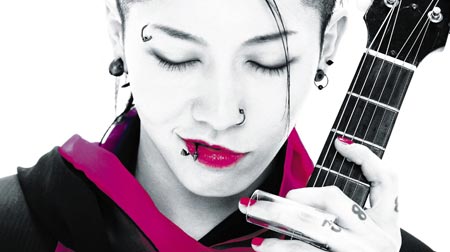
|
The years passed as they always do and Chiyo grew into an awkward adolescent. His “father” Mark Watanabe was a stable provider for the family, a musician turned producer in his old age. If Akiko sometimes found herself bored with her husband, she kept her mouth shut and dreamed of her one night of bliss with Susumu and the wonderful child that that union had created. As far as Mark knew, the child was his, and although Akiko knew better she decided to keep it to herself.
Chiyo’s father caught him several times throughout his formative years plundering through his mother’s closet, trying on outfits and prancing around, and although he was concerned Akiko assured him it was just a passing phase. Truthfully, his mother didn’t care what her son did, as long as it brought him happiness. All too well she remembered her family and their insistence on normality which only caused her to rebel the more. As such, Chiyo was in for a shock when he began school.
Chiyo’s elementary years were bad enough as he found himself fundamentally different from those around him, but it wasn’t until high school that things started getting worse. By this time he’d suffered constant abuse over his “sissy” ways and had gotten himself in innumerable scuffles. He began taking a strange pride in his ability to fight, or in some cases, to take a beating. And if that wasn’t bad enough Chiyo had begun to take other outcasts under his wing, defending them from bullies even more than he would himself. His fatalistic attitude landed him several hospital visits and that, combined with the whispered confession of his sexual preference after his flamboyant boyfriend of the week showed up at the hospital, was when his mother realized that something really needed to be done. That was when she bought him his first guitar.
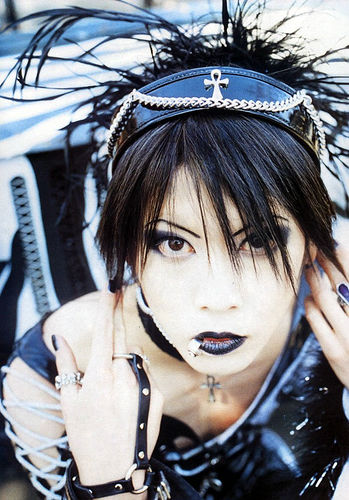
|
The teen became as obsessed with music as his mother ever was, channeling all of his rage and angst into his instrument. He embraced punk as his personal outlet, finding it a perfect fit to his emotional torment while providing a slightly more acceptable way of dress—the punk aesthetic of makeup, crazy hairstyles and a certain androgyny filled his almost subconscious need to dress in women’s clothes. Through punk Chiyo discovered anarchy, political activism and fighting for a cause. The youth found himself embroiled in a hundred different riots, protest marches and strikes, subconsciously trying to fill the empty hole in his heart that was his lack of purpose. He had his music, he had his loving mother and his distant father, he even had his own unique form of expression, but he intrinsically knew that there was more to yearning than he had experienced. The only time that he ever found peace with himself was when he volunteered at the soup kitchens and homeless shelters in the city, usually dressed “incognito” in drab clothes that covered up his tattoos and wild hair. The last thing he wanted was for his hardcore image to become tarnished by his desire to help others in need.
During his 2 years practicing music, Chiyo learned of the J-Rock movement in Japan and was instantly in love. The genre typified his existence even more than punk, providing not only a connection to his ancestry but an even more outlandish form of creative freedom. He began playing small bar circuits all across Seattle, performing until his fingers bled in order to gather enough money for his dream of going to Japan. His parents, specifically his mother, thought it would be a wonderful idea for him to visit the land of his ancestors, but she also thought it would be a lesson in responsibility for her son if he were to pay for the trip himself.
At 18 Chiyo finally made enough money and flew to Japan. Although his mother didn’t realize it, he planned on staying, taking this opportunity to leave behind his tumultuous past and begin anew. After he hit it big in the J-Rock industry he would reconnect and maybe even convince Akiko of leaving her plain Jane husband to come and stay with him. He had already thought of his stage name—Chiyoko, a form of the Japanese feminine moniker that translates to “Child of a Thousand Generations.”
After a few days in Tokyo, however, he realized that here he isn’t quite as different—the J-Rock movement had hit it big, and waifish strung out Japanese boys with multi-colored hair hung out on every street corner. In a manner of weeks his money ran out and he found himself on the street, 18 years old, with no friends, no contacts, and no cash. He was too proud to call his mother and too caught up in the culture and drive of his native Japan to leave. He decided he would stick it out, do what he needed to do, and get by.
Two years later it is the present, and he is still on the streets, in full drag now, making ends meet by whatever means necessary. He goes by the name Chiyo, a shortened form of his stage name. He holds down a fragile job as a dishwasher in a noodle bar, and when not up to his armpits in suds is either getting high on the latest designer drug or on the street corner with his battered guitar, hoping for big tips. He’s even turned the odd trick now and then, usually with American businessmen who can appreciate fluent English and a tight narrow ass. But all things aside, he still loves life. There’s so much to do, so much to see, so many people to fuck over! He’s found a place, of sorts, among the other street rats that share his corner of the city, and no matter how hungry, sore, or tired he might be, he always manages to lend a helping hand now and then, be it with a warm meal smuggled out of the noodle bar or a brass knuckle sandwich to some pervert harassing a prostitute. And besides, there’s always his purpose. Some days he can feel it, a living thing just out of reach, taunting him with the mundane and meaningless drivel the world is full of. One day, soon, Chiyo will meet his purpose head on, and he’ll be ready. Ready to kick its ass!
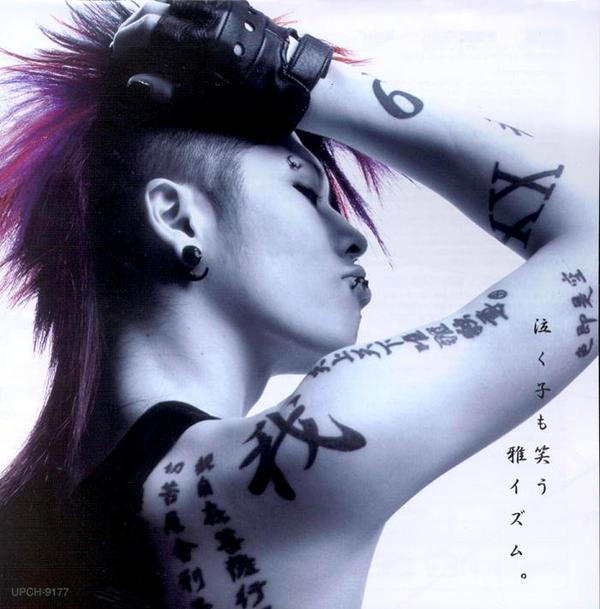
|
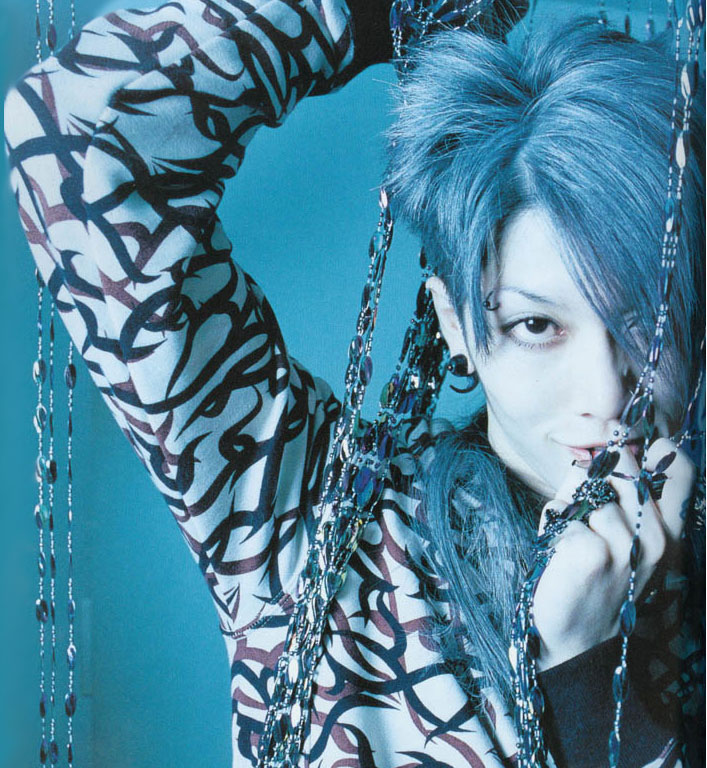
|
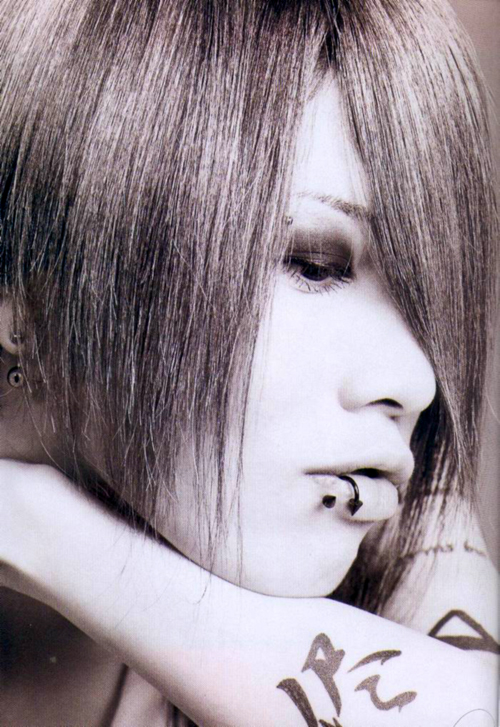
|